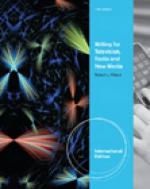|
This section contains 753 words (approx. 3 pages at 300 words per page) |

|
Although wireless technology developed prior to World War I, only experimental broadcasting occurred prior to 1920. World War I army and navy training introduced thousands of men to radio's technology and applications. Pooling (sharing) of patents allowed the manufacture of the best radio equipment. By World War II, radio broadcasting had become an established mass medium and contributed strongly to the war effort. After World War II, television replaced radio as the source of news for most Americans.
Radio and World War I
Radio played only a limited role in the First World War. Telegraph and telephone were more important on the battlefield, and newspapers, magazines, and film communicated war news to the homefront. The few experimental broadcasters closed down from 1917 to 1919. Because the military needed trained personnel, thousands of men (and a few women) learned radio's technology. To...
|
This section contains 753 words (approx. 3 pages at 300 words per page) |

|


